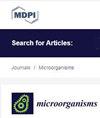美国东南部河流中与淡水贻贝有关的微核生物
IF 4.1
2区 生物学
Q2 MICROBIOLOGY
引用次数: 0
摘要
微真核细胞是一个种类繁多、经常被忽视的微生物群体,在食物网和其他生态联系中非常重要。人们对与水生无脊椎动物相关的微核生物知之甚少,尽管贻贝等滤食性动物在进食时很可能会摄入微核生物并有可能将其保留在肠道中。海洋贻贝物种中的微真核细胞(如 apicomplexans)已有报道,但还没有研究探讨淡水贻贝中是否存在这些微生物,或它们与贻贝宿主物种或环境条件的关系。在这项研究中,从美国东南部河流中采集的 22 种淡水贻贝中的 300 多种贻贝的肠道组织中提取了微生物群落 DNA。使用 PCR 扩增法检测微真核细胞 DNA,然后对阳性扩增子进行测序。在检测的贻贝个体中,有 167 个(53%)发现了微真核细胞。扩增子包括甲藻/藻类,贻贝物种之间存在差异,它们可能是食物来源,与同时分析的水和沉积物样本中发现的食物来源不同。共有 5%的阳性扩增子为非光合藻类,可能代表寄生微核生物。了解淡水贻贝肠道微生物组中微真核生物的分布情况,可以进一步了解贻贝种群数量持续下降的原因。本文章由计算机程序翻译,如有差异,请以英文原文为准。
Microeukaryotes Associated with Freshwater Mussels in Rivers of the Southeastern United States
Microeukaryotes are a diverse and often overlooked group of microbes that are important in food webs and other ecological linkages. Little is known about microeukaryotes associated with aquatic invertebrates, although filter feeders such as mussels are likely to take in and potentially retain microeukaryotes in their gut while feeding. Microeukaryotes such as apicomplexans have been reported in marine mussel species, but no studies have examined the presence of these microorganisms in freshwater mussels or how they relate to mussel host species or environmental conditions. In this study, microbial community DNA was extracted from the gut tissue of over 300 freshwater mussels, representing 22 species collected from rivers in the southeastern USA. Microeukaryote DNA was detected using PCR amplification, followed by the sequencing of positive amplicons. Microeukaryotes were found in 167 individual mussels (53%) of those tested. Amplicons included dinoflagellates/algae that differed between mussel species and are likely food sources that were distinct from those found in water and sediment samples analyzed concurrently. A total of 5% of the positive amplicons were non-photosynthetic alveolates that could represent parasitic microeukaryotes. Understanding the distribution of microeukaryotes in the freshwater mussel gut microbiome could further our understanding of the ongoing decline of mussel populations.
求助全文
通过发布文献求助,成功后即可免费获取论文全文。
去求助
来源期刊

Microorganisms
Medicine-Microbiology (medical)
CiteScore
7.40
自引率
6.70%
发文量
2168
审稿时长
20.03 days
期刊介绍:
Microorganisms (ISSN 2076-2607) is an international, peer-reviewed open access journal which provides an advanced forum for studies related to prokaryotic and eukaryotic microorganisms, viruses and prions. It publishes reviews, research papers and communications. Our aim is to encourage scientists to publish their experimental and theoretical results in as much detail as possible. There is no restriction on the length of the papers. The full experimental details must be provided so that the results can be reproduced. Electronic files and software regarding the full details of the calculation or experimental procedure, if unable to be published in a normal way, can be deposited as supplementary electronic material.
 求助内容:
求助内容: 应助结果提醒方式:
应助结果提醒方式:


